We already have the tools to prevent another accident like Air France 447. Lidar or laser radar true airspeed meters are in use at university wind tunnels, National Center for Atmospheric Research and NASA wind tunnels.The problem that my idea will solve is the mis-
interpretation of the direction of the relative wind.
When first learning to fly, within about 8 or 10 hours, an aspiring pilot has developed his
imagination of how to fly the airplane. The instructor can trust the student enough to fly alone. The novice develops his imagination by observing the behavior of his airspeed meter and altimeter. He also becomes aware of the height of the nose to the horizon and wings being level with the horizon.
A pilot instead can be displayed his projected path through the air. Much like a computer flight game, his direction can be constantly displayed on the windshield. Convention for displaying the direction of flight is with reference to the Earth. The more important information is instead the direction of flight through the air.
According to Galileo and later Einstein, there is no natural or preferred frame of reference for motion (specifically translation). These physicists say that you can choose any frame of reference. Choosing the Earth as the frame of reference for the airplane ignores the more important frame of reference of the undisturbed air around the airplane.
Flight path indicators in military jets generally use, as a frame of reference, the Earth. The true airspeed vector direction orients the pilot with respect to a block of air not yet disturbed by the plane. A true airspeed vector direction can be easily displayed on the pilot's windshield or a
heads-up-display. My own realization of how to display the vector direction appeared to me during a non-precision approach to Rome, New York. Large, sparse and buoyant snowflakes appeared to diverge from our path through the air. A similar display appears on many science fiction films of high speed flight among the stars. We do not need gauges to help our imagination; especially if these gauges were more at home on the back of a locomotive boiler.
Our indicated airspeed gauges and altimeter are simply pressure gauges. A novice pilot or an airline pilot need not use antiquated panel gauges to interpret where he is flying. Instead display his direction of flight ahead of him. Give the pilot a view of the invisible air.
I realize that displaying snowflakes is not the only way to display this information.
Had the copilots of Air France 447 had a snowflake display like I had at Rome, New York, their
snowflakes would be blowing straight up on their windshield. Most any pilot would interpret that as stalling or sinking.
Four marks also diplayed could be the no-lift angle, the maximum-lift angle, maximum lift to drag, and the square root of maximum lift to drag angles. Such marks help optimize climb, glide, and fuel economy.
.
Like this entry?
-
About the Entrant
- Name:David Jones
- Type of entry:individual
- Software used for this entry:Windows XP
- Patent status:none

